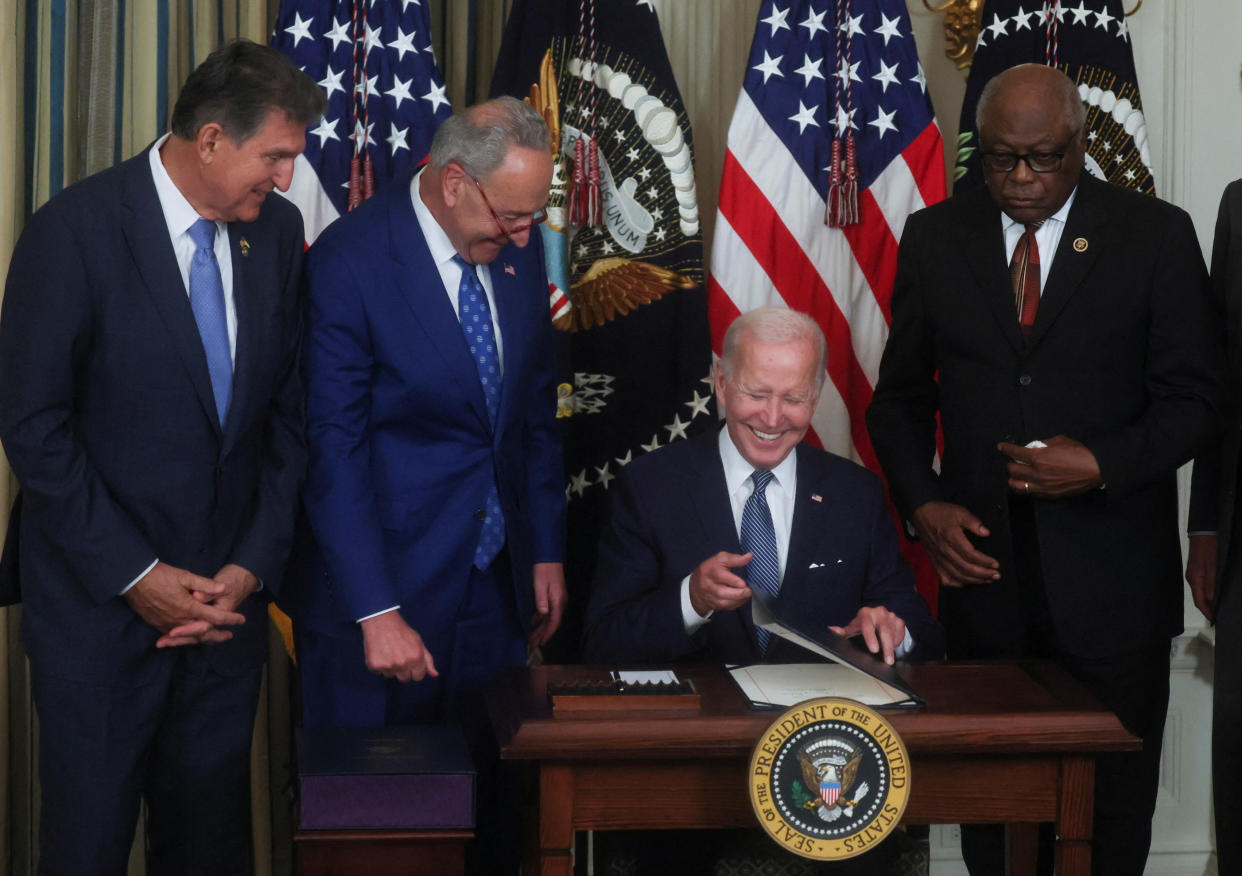U.S. tax competitiveness remains steady this year ahead of big changes for 2023
On Monday, the Washington-based Tax Foundation released its annual International Tax Competitiveness Index for 2022. They found the U.S. holding steady at 22nd among 38 of the world's top economies.
The annual report ranks the world’s tax codes and is closely watched by U.S. policymakers, especially Republicans, who are likely to regain some power in Washington after next month's midterm elections.
But the rankings could be set for a shakeup in 2023 as parts of President Biden’s Inflation Reduction Act come into force —and top world economies scramble to implement a landmark global minimum tax deal.
"While it's hard to say with full certainty, since other OECD countries may implement changes too, the U.S. rank will likely be slipping in coming years if the U.S. does not address some expiring provisions, or the complexity, that new policies from the Inflation Reduction Act bring to the U.S. tax code,” Daniel Bunn, the Tax Foundation’s Executive Vice President and author of the report told Yahoo Finance upon release of the report on Monday.

The report looks at 40 different variables from the worlds of corporate to individual to property to consumption taxes— and favors nations that collect revenues in a way that is sufficient for the government, but doesn't hamper the economic sector.
"The structure of a country’s tax code is a determining factor of its economic performance," the report begins, noting that "poorly structured tax systems can be costly, distort economic decision-making, and harm domestic economies."
This year, the U.S. again lagged behind some business friendly areas like New Zealand and Switzerland, but came in ahead of other world powers like the United Kingdom and Italy. U.S. adversaries like China and Russia are not tracked by the OECD and do not appear on the rankings.
Where the U.S. ended up
Atop the rankings, for the ninth year in a row, is Estonia. The small northern European nation is credited in the report for a tax code that, among other things, only taxes corporations on their distributed profits and doesn't tax personal dividends when looking at individual income taxes. In the eyes of the foundation's researchers, that structure is optimal to spur economic growth while allowing the government to raise enough to function.
The way the rankings are structured, the country ranked number 1 is seen as the one that is best designed to promote economic development while also raising enough for the government to operate.
At the bottom of the rankings, in 38th place, is France. The country was dinged in Monday’s report for many features of its tax code, but mostly for their wealth tax on real estate. Wealth taxes are seen by many economists as a drag on economic growth and - to boot - they are very hard to enforce evenly.

Roughly in the middle, once again, is the United States. This year's standing is identical to where the U.S. stood in both 2020 and 2021. Under the hood, the U.S. ranked at 22nd when it comes to its corporate tax policy, 21st on individual taxes, 3rd on consumption taxes, 29th on property taxes, and 35th on its cross-border tax rules.
The rankings are more than just a measure of the tax rates. The report also takes into consideration taxes that are levied in an economically disruptive way. Under consumption taxes, for example, nations are dinged if their sales tax systems only apply to some goods, but not others under the idea that an evenly applied sales tax wouldn't change consumer behavior.
Changes coming in 2023
The ranking released this week are for the 2022 tax landscape. But the Inflation Reduction Act and other changes from Washington D.C. will surely change things next year.
The new law, signed by President Biden in August will institute a new minimum corporate tax of 15% on corporations that have made over $1 billion in book profits. The new law also adds a new 1% excise tax on stock buybacks.
Both provisions will take effect on Jan. 1, 2023.
"A lot of these things just add complexity to the system," says Bunn of the changes, adding that the changes could drop the U.S. to a ranking of 24th if things go forward as planned.
Bunn is concerned that the new minimum corporate tax could make the U.S. less competitive and also that a key provision of the 2017 Tax Cuts and Jobs Act will expire and hurt U.S. competitiveness.
That provision offers businesses full expensing for equipment and begins to phase out in 2023. The foundation has previously called it "the most important temporary tax provision." But the Biden administration and Democratic lawmakers have shown little interest in renewing it.
In addition, the U.S. and other nations recently agreed to a new global minimum tax deal that aims to ensure corporations pay a minimum rate of 15% no matter where they operate. Advocates of the ambitious deal aim have it come into effect in 2023, which has left many nations scrambling to comply with the new rules.
Ben Werschkul is a Washington correspondent for Yahoo Finance.
Read the latest financial and business news from Yahoo Finance
Follow Yahoo Finance on Twitter, Facebook, Instagram, Flipboard, LinkedIn, YouTube, and reddit.
